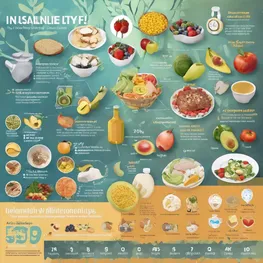Table of contents
- Demystifying Blood Sugar: A Guide for Beginners
- Optimal Diets for Balancing Blood Sugar Levels
- Transforming Your Life: Lifestyle Modifications for Managing Blood Sugar
- Mastering Blood Sugar Control: Insider Tips from Experts
- Delectable Recipes for Maintaining Blood Sugar Levels
In a world where high blood sugar levels have become increasingly common, finding natural ways to lower them is crucial for overall health. In this article, we delve into the realm of nutritional wisdom and explore effective strategies to naturally lower blood sugar levels. From dietary changes to incorporating specific foods, join us as we uncover practical tips for better managing your blood sugar and improving your overall well-being.
Demystifying Blood Sugar: A Guide for Beginners
Blood sugar, or blood glucose, refers to the amount of sugar present in the bloodstream. It is the primary source of energy for the body's cells. Insulin, a hormone produced by the pancreas, helps regulate blood sugar levels. When blood sugar levels are too high, it can lead to diabetes and other health complications. Conversely, low blood sugar can cause fatigue, dizziness, and confusion. Maintaining balanced blood sugar levels is crucial for overall health and well-being.
Optimal Diets for Balancing Blood Sugar Levels
A balanced diet is crucial in managing blood sugar levels because it ensures a steady supply of nutrients and prevents spikes in blood glucose. It includes a variety of foods such as whole grains, lean proteins, healthy fats, and fiber-rich fruits and vegetables.
Physical activity plays a crucial role in managing blood sugar levels, resulting in various benefits for individuals with diabetes or those at risk. Here are some key points to consider:
- Regular physical activity helps control blood sugar levels by increasing insulin sensitivity. When we engage in exercise, our muscles require glucose for energy, which enables them to take up glucose effectively, lowering blood sugar levels.
- Exercise helps to reduce insulin resistance, a condition where cells become less responsive to insulin. By reducing insulin resistance, physical activity allows insulin to effectively transport glucose into cells, thereby regulating blood sugar levels.
- Physical activity helps maintain a healthy body weight. Obesity and excess body fat are risk factors for developing type 2 diabetes. Regular exercise helps burn calories and promotes weight loss, reducing the risk of developing diabetes and improving blood sugar management in individuals with diabetes.
- Regular physical activity improves cardiovascular health, reducing the risk of heart disease and stroke, which are commonly associated with diabetes.
- Exercise can help relieve stress, as it promotes the release of endorphins, our body's natural mood boosters. Stress can affect blood sugar levels, and managing stress through physical activity can contribute to better blood sugar control.
- It is important to consult with a healthcare professional to design an exercise plan that suits individual needs and abilities, taking into consideration any existing health conditions or complications.
Mastering Blood Sugar Control: Insider Tips from Experts
Maintaining stable blood sugar levels is crucial for overall health. Experts recommend a balanced diet that includes complex carbohydrates, lean proteins, and healthy fats. Regular exercise, such as brisk walking or cycling, can also help regulate blood sugar levels. Other strategies include portion control, avoiding sugary beverages, and staying hydrated. Monitoring blood sugar levels regularly and adjusting medication as needed is important for those with diabetes. Finally, stress management techniques like meditation or deep breathing can also contribute to stable blood sugar levels.
Delectable Recipes for Maintaining Blood Sugar Levels
Maintaining stable blood sugar levels is crucial for overall health. Here are a few delicious and healthy recipes that can help in controlling blood sugar levels. Start your day with a bowl of overnight chia seed pudding topped with fresh berries. For lunch, try a quinoa salad with grilled chicken and mixed vegetables. For dinner, enjoy baked salmon with roasted asparagus and a side of cauliflower rice. Snack on homemade energy balls made with nuts, dates, and oats. These recipes are not only tasty but also packed with nutrients to promote stable blood sugar levels.
In conclusion, it is clear that managing blood sugar levels is crucial for overall health and well-being. Incorporating a nutritious diet filled with whole grains, lean proteins, healthy fats, and plenty of fruits and vegetables can effectively lower blood sugar naturally. Additionally, adopting lifestyle changes such as regular exercise, stress management techniques, and adequate sleep can also contribute to stabilizing blood sugar levels. It is essential to prioritize nutrition and make conscious choices in order to achieve optimal health and prevent chronic conditions like diabetes.
Frequently asked questions related to lowering blood sugar naturally
What are some ways to lower blood sugar naturally?
Some ways to lower blood sugar naturally include eating a balanced diet with plenty of fruits and vegetables, exercising regularly, managing stress levels, getting enough sleep, and staying hydrated.
Are there specific foods that can help lower blood sugar?
Yes, there are certain foods that can help lower blood sugar. These include leafy greens, cinnamon, chia seeds, turmeric, avocados, and berries.
Can stress affect blood sugar levels?
Yes, stress can affect blood sugar levels. When stressed, the body releases hormones that can cause blood sugar to rise. It is important to manage stress through relaxation techniques such as deep breathing exercises or meditation.
Why is getting enough sleep important for controlling blood sugar?
Getting enough sleep is important for controlling blood sugar because lack of sleep can disrupt the body's insulin production and increase insulin resistance. It can also lead to cravings for sugary and high-carbohydrate foods.
How does staying hydrated help in controlling blood sugar?
Staying hydrated helps in controlling blood sugar by supporting kidney function, which is important for regulating blood sugar levels. It also helps in preventing dehydration, which can lead to higher blood sugar levels.
How does exercise help in lowering blood sugar levels?
Exercise helps in lowering blood sugar levels by increasing insulin sensitivity, allowing cells to use glucose more effectively. It also helps in maintaining a healthy weight and reducing insulin resistance.







